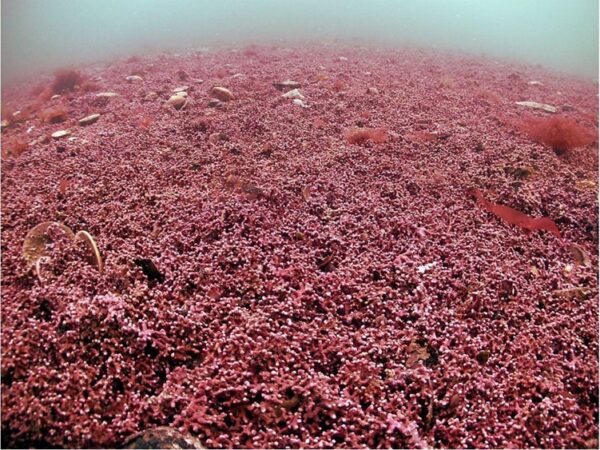Researchers from the University of Exeter and Natural Capital Solutions have recently discovered one of the biggest areas containing a rare type of seaweed only found in UK waters.
Whilst conducting surveys off the coast of Falmouth and Penzance on behalf of Cornwall Council, researchers found an area almost as large as 900 rugby pitches to be abundant with the rare and ancient seaweed known as maerl. Known for its distinctive pink-purple colour and small stature, maerl is a slow growing seaweed which can take many hundreds of years to grow just a few cm.
Blue carbon habitats
The work untaken by the researchers was to assess how effective seagrass and seaweed are at growing and storing ‘blue carbon’ in Cornish waters as part of the Blue Natural Capital Project. Blue carbon is carbon that is captured and stored in marine habitats, and is being researched to understand its ability to help balance climate change.
Whilst working within the Fal and Helford Estuary Special Area of Conservation the vast area of mearl was discovered.
Senior Lecturer in Marine Biology at the University of Exeter and research lead, Dr Chris Laing, said ‘‘Maerl has not been considered as a valuable carbon store to date, but our research demonstrates that as well as being a rare and valuable seabed habitat it should be a key player in coastal blue carbon assessments which is an extremely important discovery for Cornwall where the extent of the maerl beds are significant.”
 Credit: Mark Milburn/Atlantic Scuba
Credit: Mark Milburn/Atlantic Scuba
Importance beneath the waves
Due to its slow-growing, delicate tendencies the council is now working the university and other marine partners to protect the vulnerable ecosystem from threats such as sea surface temperature increases, anchor damage and nutrient discharge.
Cornwall’s cabinet member for environment and climate change Cllr Martyn Alvey said: “The project shows how these blue carbon habitats can help us in our response to both the climate and ecological emergencies if we properly protect them and allow them to fully recover. We are working with partners to ensure that these vital blue carbon ecosystems are protected from threats such as poor water quality, recreational boating and nutrient loading.”
The information found by the project will help Cornwall Council and its partners direct the next stages of blue carbon research and support the development of national blue carbon policies.
Read the full press release from Cornwall Council here.